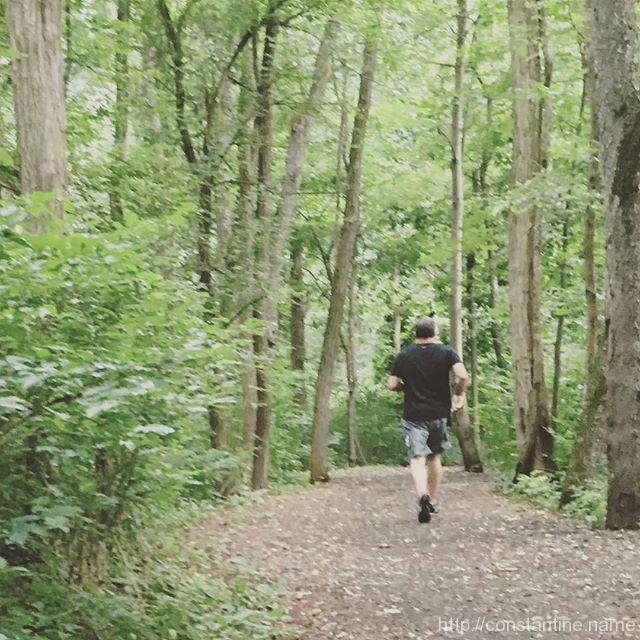Those who can’t find anything to live for, always invent something to die for. Then they want the rest of us to die for it too.
~ Lew Welch
slip:4a1459.
Those who can’t find anything to live for, always invent something to die for. Then they want the rest of us to die for it too.
~ Lew Welch
slip:4a1459.
History will have to record that the greatest tragedy of this period of social transition was not the strident clamor of the bad people, but the appalling silence of the good people.
~ Martin Luther King, Jr.
slip:4a1240.
The reward for virtue is the understanding of the good deed.
~ Cicero
slip:4a978.
And Stoicism, it could be said, is a philosophy about how to make better choices. This is what we see in a book like Meditations. We see Marcus Aurelius journaling, working to get better at choosing. Choosing the right things to value, the right things to think, the right things to focus on, the right response to a difficult situation.
~ Ryan Holiday from, Life Is Up To You: 8 Choices That Will Make Your Life Better – RyanHoliday.net
slip:4uryco1.
One of the first things you learn about philosophy is that the word means “the love of truth.” It’s the sort of clever thing a much younger version of myself would have bludgeoned others with. “See me study philosophy!” I long ago learned to set aside such cleverness.
Fortunately I learned that philosophy—at least, the sort I’m interested in—is about self-improvement. The proof of my work shows in myself… in my actions and the way I think, and is noticeable to those who care to pay attention. (I’m not suggesting that everyone should pay attention to me.) Surprisingly, at the deeper level of self-improvement, reminding myself that “philosophy” means “the love of truth”, has returned to being a great thing to trot out regularly… as a reminder to myself.
ɕ
Characteristics of the rational soul: Self-perception, self-examination, and the power to make of itself whatever it wants. … It surveys the world and the empty space around it, and the way it’s put together. It delves into the endlessness of time to extend its grasp and comprehension of the periodic births and rebirths that the world goes through. It knows that those who came after us will see nothing different, that those who came before us saw no more than we do, and that anyone with forty years behind him and eyes in his head has seen both past and future—both alike.
~ Marcus Aurelius
slip:4a461.
An embarrassment of riches swamps me. I have so arranged things that everywhere I turn I find inspiring ideas, growth-catalyzing goals, and outlandish opportunities.
This morning I tenderly cracked open a new-to-me book, (Community: The Structure of Belonging by P Block, 2nd ed., 2018,) and inserted a bright blue, ribbon bookmark. I turned past the first page, then past the second page, and read the dedication:
To Maggie — In appreciation for your commitment, intelligence, love, and integrity that make what I do possible. You are a placeholder for all who give their talents and love in support of others. Your question “Who will do what by when?” changes the world.
~ Peter Block, ibid.
slip:2co1.
I have never had that particular formulation in mind. But I’ve had that sentiment as a driving force for decades. Thank you “Maggie” and Peter Block for making something so long fuzzy for me, perfectly clear.
Yes, indeed! Who will do what by when?
ɕ
Jot down every loop that opens; whether it comes via email, or a phone call, or a Zoom meeting, or Slack. Because these loops might emerge rapidly, use a minimalist tool with incredibly low friction. I recommended a simple plain text file on your computer in which you can record incoming obligations at the speed of typing (a strategy I elaborate in this vintage post).
~ Cal Newport from, On Confronting the Productivity Dragon (take 2) – Cal Newport
Then, at the beginning of each day, before the next onslaught begins, process these tasks into your permanent system. In doing so, as David Allen recommends, clarify them: what exactly is the “next action” this task requires? Stare at this collection before getting started with your work.
slip:4ucabo37.
This two part process is the backbone of how I get things done. When I find I have too many ideas rattling in my head it’s time to do a bunch of “capture.” One’s mind is for having ideas not for holding them. I prefer to write things down rather than using a digital device. Yes, my phone [at least] is very often at hand—but I’m a digital import, not a native, so thumb-typing is torture.
Everyone agrees that capturing everything—whether digital or analog, notes, meeting minutes, thoughts, doodles, lists, everything… Capturing everything is important and useful.
But almost everyone has not fully apprehended that second part: Process that collection from yesterday. Every day review all the “captured” stuff and brutally assess it. Can I just ignore it/cross it off as done? Can I put that onto some other list (groceries, errands, etc.)? Why did I capture this? …is it a dream, a flaming urgency, something I want to think more about?
ɕ
I read now for the same reasons I read then — to feel less alone. But I read for more than that: Reading teaches me the answers to problems I haven’t had yet, or to problems I didn’t even know how to describe. And when I feel less alone with what troubles me, it is easier to find solutions. A book to me is like a friend, a shelter, advice, an argument with someone who cares enough to argue with me for a better answer than the one we both already have. Books aren’t just a door to another world — each book is part of a door to the whole world, a door that always has more behind it. Which is why I still can’t think of anything I’d rather do more than read.
~ Alexander Chee, from A Velocity of Being, which I found via, Alexander Chee’s Lovely Letter to Children About How Books Save Us – The Marginalian
slip:4ubaae3.
I’ve mentioned elsewhere that growing up, it was a 20-minute drive to anything. A true bookstore, or even a public library, was farther still.
But I do distinctly remember the feeling of being among books. At a book store, at my high school’s library, at the closest [small] city’s public library, and eventually at my university’s two libraries. To be honest, I don’t know when last I thought of that feeling, until it bubbled up, just now as I write. The lighting. The sound-scape. The smells. The furtniture. And of course the books. Knowledge and experiences and surprises and questions beyond belief.
(Woa! I just remembered the huge amount of time I spent thinking about one day having a proper study. My own personal library, meets workspace, meets inner sanctum. And I’m reminded that I’m currently obsessed with finding a good chair for reading.)
But it’s all about the books.
Carl Sagan captured it best when we said, “Humans work magic.”
ɕ
Action’s ecstasy is instantaneous and compounding: even if for the millionth time, it works its magic. Its trigger is sure: All you do is peel your ass off the bottom of whatever hole you’re in, and climb.
~ Bryan Ward from, The #1 Drug For Dads
slip:4utiai6.
I can vouch for the potentcy of this drug. And it’s method of action is clear: With each small action which demonstrates one can affect one’s environment, the pattern of learned helplessness is broken.
ɕ
slip:4a98.


Leaving St Pancras station this morning en route to Paris. When I was in high school, I saw a TV show (yes, pre-internet) about some crazy engineers who were going to try tunneling thru the chalk under the channel. “How awesome would it be to ride THAT train?!” Bit sad to say goodbye to all my friends (old and new) in London, but we will meet again! Allez! Allez!
ɕ
This post presents a gallery of ALL images in this series. You can click on any to enlarge; you can even click on the first, sit back, and it’ll run them all as a slide show. The gallery is dynamic so it will automatically grow as I add more posts to this series.
For each person there is a sentence – a series of words – which has the power to destroy them.
~ Philip K. Dick
slip:4a304.

Another step closer to done; backsplash tile!
ɕ
“Manage your energy, not your time.” This is the quote that made Tony Schwartz famous. And it’s one that I believe best represents a truly efficient lifestyle in the 21st century. Yet, living “manage your energy, not your time” is incredibly hard, at least for me. It probably took me around a year to fully grasp its meaning. Since then, I’ve turned my life upside down and changed my routine dramatically.
~ Leo Widrich from, The Four Elements of Physical Energy and How To Master Them | Lifehacker
slip:4ulite2.
ɕ
Since 1998 I have been continuously and vigorously studying and practicing a martial art called Aikido. Over the years my responsibilities have gradually increased to the point where I am now straight-up teaching Aikido. I was having a terrific time exploring Aikido while trailing in the footsteps of many senior people. I’m now surprised to find that a bunch of people have appeared behind me asking questions.
What is this I don’t even…
I am currently teaching at the Kinokawa Aikido LV dojo, and I study under Sensei Michael Wirth at Main Line Budo.
ɕ